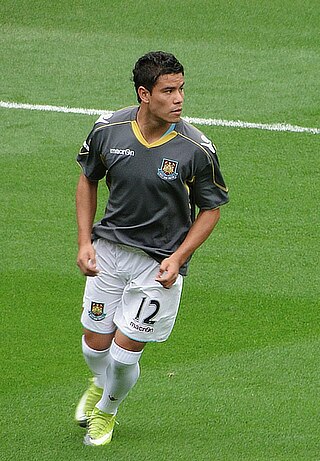
Marco Antonio Barrera Tapia is a Mexican former professional boxer who competed from 1989 to 2011. He held multiple world championships in three weight classes between 1995 and 2007, from super bantamweight to super featherweight.

Minatitlán is a city in the Mexican state of Veracruz. It is located in the southeastern part of the state, in the Olmeca region, to the north of the Isthmus of Tehuantepec, along the Coatzacoalcos River.

Pablo Edson Barrera Acosta is a Mexican professional footballer who plays as a winger for Liga MX club Querétaro.
Roberto González Barrera was a Mexican businessman. He was the chairman of Gruma, the largest producer of tortillas and corn flour in the world, and of Banorte, the largest Mexican-owned private bank in Mexico. Because of his prominent role in the expansion of Gruma, he was often nicknamed "El Maseco" or "Don Maseco", as well as the "King of Tortillas".
Primera División de México(Mexican First Division)Verano 2001 is a Mexican football tournament - one of two short tournaments that take up the entire year to determine the champion(s) of Mexican football. It began on Saturday, January 6, 2001, and ran until April 19, when the regular season ended. In the final Santos Laguna defeated Pachuca and became champions for the second time.
Primera División de México(Mexican First Division)Invierno 1998 is a Mexican football tournament - one of two short tournaments that take up the entire year to determine the champions of Mexican football. It began on Friday, July 31, 1998, and ran until November 22, when the regular season ended. Pachuca was promoted to the Primera División de México thus, Veracruz was relegated to the Primera División A. In the final Necaxa defeated Guadalajara and became champions for the 3rd time.
Chinampa de Gorostiza is a town and its surrounding municipality in the Mexican state of Veracruz.
The Copa 2012 MX Apertura was the 68th staging of the Copa MX football tournament, the 41st staging in the professional era and the first played since the 1996–97 edition.

Manuel María del Pilar Eduardo de Gorostiza y Cepeda was a Mexican writer, dramatist and diplomat. He was the son of Pedro Fernández de Gorostiza, governor of the port of Veracruz, and the poet Rosario Cepeda. Gorostiza was in 1824 the first Mexican ambassador to the United Kingdom of the Netherlands. Later he was ambassador in London. Gorostiza was the Mexican envoy to the United States in 1836 with the mission to halt the support of Washington to Texas. As Mexican Minister of Foreign Affairs in 1838 and 1839 he had to deal with the Republic of Texas.
The Copa 2013 MX Clausura was the 69th staging of the Copa MX, the 42nd staging in the professional era and is the second tournament played since the 1996–97 edition.
Eduardo Rergis Pacheco is a Mexican former footballer and manager.
Eduardo de Jesús Arredondo Miguel is a Mexican former professional baseball player. He was known for not striking out often. Arredondo was one of the best players for the Mexico national baseball team in the 2013 World Baseball Classic.
Joaquín Urquiaga was a football player and manager who played professionally in Mexico and Spain.
Baruch Alberto Barrera Zurita is a Mexican politician affiliated with the Institutional Revolutionary Party. As of 2014 he served as Deputy of the LIX Legislature of the Mexican Congress as a plurinominal representative.
Events in the year 1990 in Mexico.

Kim Leine Rasmussen is a Danish-Norwegian author who writes about Greenland.
El amor llegó más tarde (English: Love Came Later is a Mexican telenovela produced by Irene Sabido for Televisa in 1979.
La prepago is a Colombian telenovela produced by Sony Pictures Television for RCN Televisión, based on the popular book written by Carlos Duplat, Las memorias de Andrea.

The second federal electoral district of Veracruz is one of the 300 electoral districts into which Mexico is divided for elections to the federal Chamber of Deputies and one of 19 such districts in the state of Veracruz.





